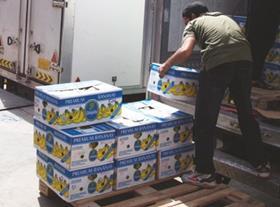
Volumes of fresh produce entering the UAE have fallen, according to Dubai traders, as companies introduce stricter payment terms and as the troubles in Saudi Arabia continue.
According to Hani Ayloush, owner of Fruit Line Trading, demand has dropped from Saudi Arabia, where low oil prices and the continuing war with neighbouring Yemen have stymied trade.
“Here in the UAE, we can sell to various markets, including Dubai, Oman and Sudan,” said Ayloush. “With Saudi Arabia, it’s different. If it goes to Riyadh, where we have an office and a shop at the wholesale market, it has to be sold there, and traders are currently struggling to sell everything. A lot of companies have been affected by the oil price.”
The slowdown on the Saudi market is especially unfortunate given the high purchasing power of consumers in cities like Riyadh, which boasts a population of over 6m and imports predominantly top-quality fruit.
An optimist might hope that Iran, whose population of around 82m stands second in the region only to Egypt’s, might take up some of the slack now that sanctions have mostly been lifted. However, the effect has not yet been felt, according to one UAE trader, due in part to Iranian companies’ difficulty in obtaining import permits.
“Coconuts, pineapples, mangoes and bananas are the only items that can be imported into Iran legally,” he said. “This won’t change quickly. The Iranian ministry of agriculture wants to support local producers, so they don’t want companies in Iran importing commodities.”
In fact, the Iranian government has created incentives for exports of items such as apples, offering major tax breaks on banana imports. Before March, importers of bananas paid a duty of 4 per cent. This has increased to 26 per cent, but a company that exports 1.5kg of apples can now import 1kg of bananas at a rate of just 5 per cent.
However, it is the huge damage that the sanctions have already done to the Iranian economy that ultimately continues to limit imports, plus the fact that dollar transactions remain banned for Iranian firms. Many also believe the identity of the next US leader could be pivotal to developments, with the prospect of a president Donald Trump prompting many companies to adopt a wait-and-see policy.



